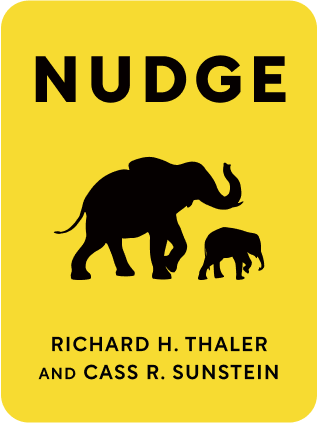

This article is an excerpt from the Shortform summary of "Nudge" by Richard H. Thaler and Cass R. Sunstein. Shortform has the world's best summaries of books you should be reading.
Like this article? Sign up for a free trial here .
What are the three kinds of decisions that warrant nudges? How can you improve your decision-making skills?
In the book Nudge, Thaler and Sunstein explain that we make choices without realizing how the way they’re presented affects us. Not all decisions require nudges, but there are three common types that do.
Keep reading to learn about the three kinds of decisions that warrant nudges.
Nudges, and the Kinds of Decisions to Nudge
According to the authors of Nudge, Thaler and Sunstein, not all decisions require nudges. (Although it’s important to remember that all choices feature some sort of design and so, in effect, feature nudges, whether on purpose or not.) The kinds of decisions that most warrant nudges are:
1. Rare and Difficult Decisions
Saving for retirement, buying a house, or choosing a college are each monumental decisions that come around once or rarely in a lifetime. Because we only have one or two cracks at each decision, we have no opportunity to learn if we make a mistake. Thus they’re prime candidates for nudges.
(Shortform note: A libertarian counterargument might be that, when it comes to major life decisions, no one, no matter how well-intentioned, should be putting their finger on the scale. But, as Thaler and Sunstein note, all choices, whether purposely or not, already feature nudges, and so it’s acceptable to curate that choice to improve outcomes.)
2. Decisions With Delayed Outcomes
For many decisions, the results of our choices are immediate and clear. When we use our debit card to buy a gift for a loved one, we see the consequences of that choice reflected almost instantaneously on our account statement.
For other decisions, however, the outcomes of our choices are delayed or obscure. For example, someone can smoke for years and experience no negative effects—until the day he or she suffers a stroke. Nudges can help us make better decisions in situations like these, when the consequences of our actions aren’t immediately apparent.
(Shortform note: Thaler and Sunstein’s assumption here is that, although the outcome is delayed for the chooser, it’s immediate—or at least known—to the choice designer. But there are any number of choices where the ultimate outcomes are unknown to all. Take smartphone use, for example. Studies have shown that smartphones boost worker productivity—in addition to providing convenience—yet the long-term health effects of consistent cell phone use remain unclear. In this circumstance, it might be perilous to nudge someone toward or away from using a cell phone.)
3. Decisions Requiring Specialized Knowledge
Many of the most important decisions we face—choosing a retirement or health care plan, for example—are presented to us using specialized terms that can confuse more than inform. Most of us—unless we work in finance—would be at a loss when faced with terms like “defined contribution” and “expense ratio.” Given especially complex and unpredictable options, nudges can be vital.
(Shortform note: These sorts of nudges can also be used to take advantage of the layperson. For example, a financial firm might nudge a client toward an investment that benefits the firm itself more than the investor.)
| Decision-Making 101 Nudges aren’t the only way to improve people’s decision-making; in fact, there’s a vast literature dedicated to helping us think twice (sometimes literally!) before making a choice. Tony Robbins’s Awaken the Giant Within teaches readers to take control of their “Master System”—the ideas, emotions, values, beliefs, and experiential reference points that inform any decision. In Atomic Habits, James Clear shows how half of our daily actions (i.e., decisions) are force of habit. Once we become aware of our habits and how to change them, we can also improve our decision-making. In Multipliers, Liz Wiseman and Greg McKeown break down the personal qualities that result in successful leadership. “Multipliers”—those leaders who add value to whatever situation they find themselves in—consult as many people as possible, especially if they have divergent viewpoints, before coming to a decision. In The Gifts of Imperfection, author Brené Brown writes that one of the keys to living “wholeheartedly” is to follow your intuition when making a decision. She advises her readers to let go of the need for certainty and simply “go with your gut. ”Daniel Kahneman, in Thinking, Fast and Slow, writes that when it comes to high-stakes decisions, we absolutely must think twice—that is, we have to use our careful and deliberate system of cognition (System 2) to augment our intuitive, automatic system (System 1). Which approach to decision-making is the most effective? Is it better to seek out as much advice as you can (Wiseman and McKeown), think twice (Kahneman), or go with your gut (Brown)? There’s evidence to support each, yet Thaler and Sunstein would likely say that the answer is immaterial: Because nudges rely on our tendency to err, they remove—or at least reduce—the need for improved decision-making skills. |

———End of Preview———
Like what you just read? Read the rest of the world's best summary of Richard H. Thaler and Cass R. Sunstein's "Nudge" at Shortform .
Here's what you'll find in our full Nudge summary :
- Why subtle changes, like switching the order of two choices, can dramatically change your response
- How to increase the organ donation rate by over 50% through one simple change
- The best way for society to balance individual freedom with social welfare






